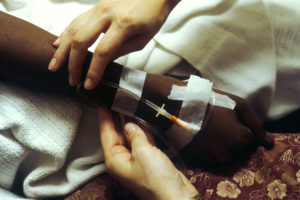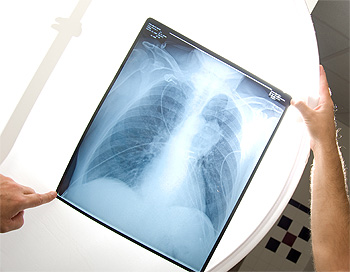According to a recent study, the majority of cancer patients believe they will live longer than their estimated prognosis. Researchers found that many patients remain optimistic about their survival chances even after their doctors give them a poor prognosis.
Professors at the University of Rochester Medical Center studied a group of 236 patients in the advanced stages of cancer. The 38 doctors treating the patients estimated that they all had less than one year to live. Despite these dismal odds, the study found that 68 percent of the patients believed that they had a 90 to 100 percent chance of surviving for two years. This was in direct conflict with the opinions of their doctors, who estimated that their patients had about a 10 percent chance of surviving that long.
Out of the 68 percent of patients who disagreed with their doctors, only 10 percent told researchers that they did so knowingly. The majority of patients in the study didn’t realize that their opinions and their doctors’ opinions differed.
This is a major issue, according to the study’s co-author, Dr. Ronald Epstein. He says, “When a patient with very advanced cancer says that he has a 90 to 100 percent chance of being alive in two years, and his oncologist believes that chance is more like 10 percent, there’s a problem.”
Lack of Information Leads to Poor Decision Making
The researchers added that optimism isn’t always misguided after a cancer diagnosis. After all, a prognosis is only a rough estimate. However, Epstein says it’s still important for patients to strongly consider their prognosis when they make a treatment plan.
He explains further that patients who ignore or don’t understand the doctor’s prognosis could choose unnecessary, aggressive treatments that won’t effectively treat their cancer. These types of treatments also greatly impact the patient’s quality of life.
For instance, chemotherapy has a number of side effects that affect a person’s quality of life. Nausea, hair loss, fatigue and anemia are just a few of these. For patients who have a promising prognosis, the benefits of chemotherapy may outweigh the side effects. But for patients who only have a few months to live, these symptoms disrupt valuable time with their families and make their end-of-life process far more painful.
Better Communication Is Key

Credit: wikimedia.org
Researchers suspect that lack of communication plays a role in the differing opinions of patients and their doctors. They recommend that doctors take more time to speak with cancer patients about their prognosis. They warn that if doctors and patients aren’t on the same page, it’s impossible for patients and their families to make informed decisions and prepare for the end of their lives.
For example, the vast majority of the participants in the study told researchers that they would prefer comfort care at the end of life rather than life-extending treatments. And seven out of 10 patients said they would choose supportive or palliative care if they knew they had less than one year to live. But if patients are unaware that the end of their lives might be close, then it’s unlikely that they will make that choice.
Researchers hope that this study will encourage doctors to have clearer, more honest discussions with their patients about prognosis. Doing so may help ensure that patients have all of the information they need to make the best decisions about their care at the end of life.

 Cancer Patients Might Be More Optimistic About Prognosis Than Their Doctors
Cancer Patients Might Be More Optimistic About Prognosis Than Their Doctors





 How to Comfort A Dying Loved One
How to Comfort A Dying Loved One
 Our Annual Seven Holiday Gifts for Someone Who Is Grieving, 2024 Edition
Our Annual Seven Holiday Gifts for Someone Who Is Grieving, 2024 Edition














